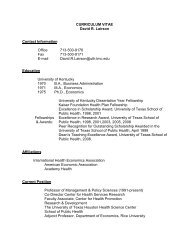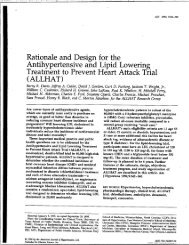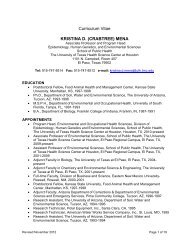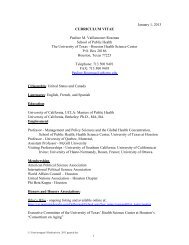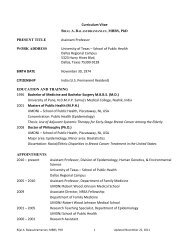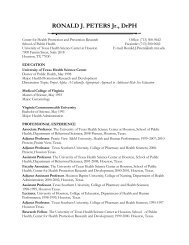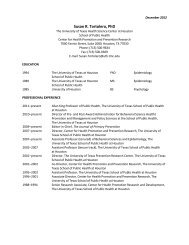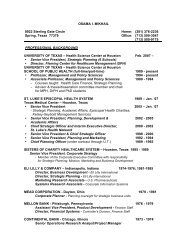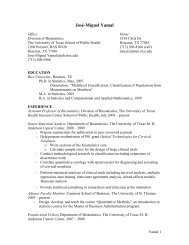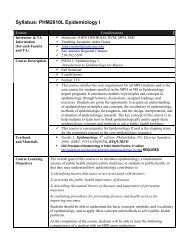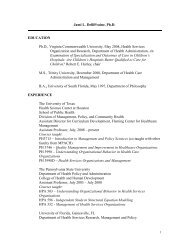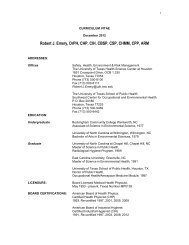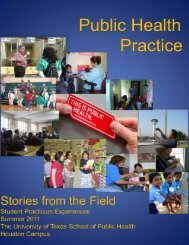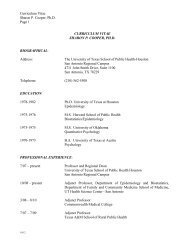Hector Balcazar, M.S., Ph.D. Education Professional Experience
Hector Balcazar, M.S., Ph.D. Education Professional Experience
Hector Balcazar, M.S., Ph.D. Education Professional Experience
Create successful ePaper yourself
Turn your PDF publications into a flip-book with our unique Google optimized e-Paper software.
19. Alvarado, M., Smolenski, M., <strong>Balcazar</strong>, H., Ortega-Harrison, Z., Della, D., Tam, T., Poolaw,L.,<br />
Lewis, R. and Jacobs, J. (1996). Community panel discussion: from research to community action.<br />
Hypertension in Hispanic Americans, American Indians and Alaska Natives, and Asian and Pacific<br />
Islander Americans. NHLBI. Public Health Reports 111 (2 Suppl) 74-76.<br />
18. <strong>Balcazar</strong>, H., Peterson, G. and Cobas, J. (1996). Acculturation and health related risk behaviors<br />
among Mexican American pregnant youth. American Journal of Health Behavior 20: 425-433.<br />
17. Cobas, J., <strong>Balcazar</strong>, H., Benin, M., Keith, V. and Chong, Y. (1996). Acculturation and low<br />
birthweight infants among Latino women: a reanalysis of HHANES data with structural equation models.<br />
American Journal of Public Health 86: 394-396.<br />
16. <strong>Balcazar</strong>, H., Denman, C., and Lara, F. (1995). Factors associated with work-related accidents and<br />
work-related disease/sickness of maquiladora workers: the case of Nogales Sonora, Mexico.<br />
International Journal of Health Services 25: 489-502.<br />
15. <strong>Balcazar</strong>, H., Trier, C. and Cobas, J. (1995). What predicts breastfeeding intention in Mexican-<br />
American and non-Hispanic White women? Evidence from a National Survey. Birth 22: 74-80.<br />
14. <strong>Balcazar</strong>, H., Castro, F., and Krull, J. (1995). Cancer risk reduction in Mexican American women:<br />
the role of acculturation, education, and health risk factors. Health <strong>Education</strong> Quarterly 22:61-84.<br />
13. Cobas, J. and <strong>Balcazar</strong>, H. (1994). Biculturality and hypertension in Mexican Americans: A<br />
comment on Markides, Lee and Ray. Ethnicity and Disease 4: 91-93.<br />
12. <strong>Balcazar</strong>, H., Keefer, L. and Chard, T. (1994). Use of anthropometric indicators and maternal risk<br />
factors to evaluate intrauterine growth retardation in infants weighing more than 2500 grams at birth.<br />
Early Human Development 36:147-155.<br />
11. <strong>Balcazar</strong>, H. (1994). The prevalence of intrauterine growth retardation in Mexican Americans.<br />
American Journal of Public Health 84:462-465.<br />
10. <strong>Balcazar</strong>, H., Hartner, J. and Cole, G. (1993). The effects of prenatal care utilization and maternal<br />
risk factors on pregnancy outcome between Mexican Americans and non-Hispanic Whites. Journal of the<br />
National Medical Association 85:195-202.<br />
9. <strong>Balcazar</strong>, H. and Cobas, J. (1993). Overweight among Mexican Americans and its relationship to life<br />
style behavioral risk factors. Journal of Community Health 18:55-67.<br />
8. <strong>Balcazar</strong>, H. (1993). Mexican Americans' intrauterine growth retardation and maternal risk factors.<br />
Ethnicity and Disease 3:169-175.<br />
7. <strong>Balcazar</strong>, H., Cole, G. and Hartner, J. (1992). Mexican Americans' use of prenatal care and its<br />
relationship to maternal risk factors and pregnancy outcome. American Journal of Preventive Medicine<br />
8:1-7.<br />
6. <strong>Balcazar</strong>, H. and Haas, J. (1991). Retarded fetal growth patterns in relation to early neonatal mortality<br />
in an urban population of Mexico City. Bulletin of the Pan American Health Organization 25:55-63.<br />
5. <strong>Balcazar</strong>, H. and Haas, J. (1991). Tipo de retardo del crecimiento intrauterino y mortalidad neonatal<br />
precoz en una muestra de recien nacidos de la ciudad de Mexico. Bol Of Sanit Panam 110:369-376.<br />
20



